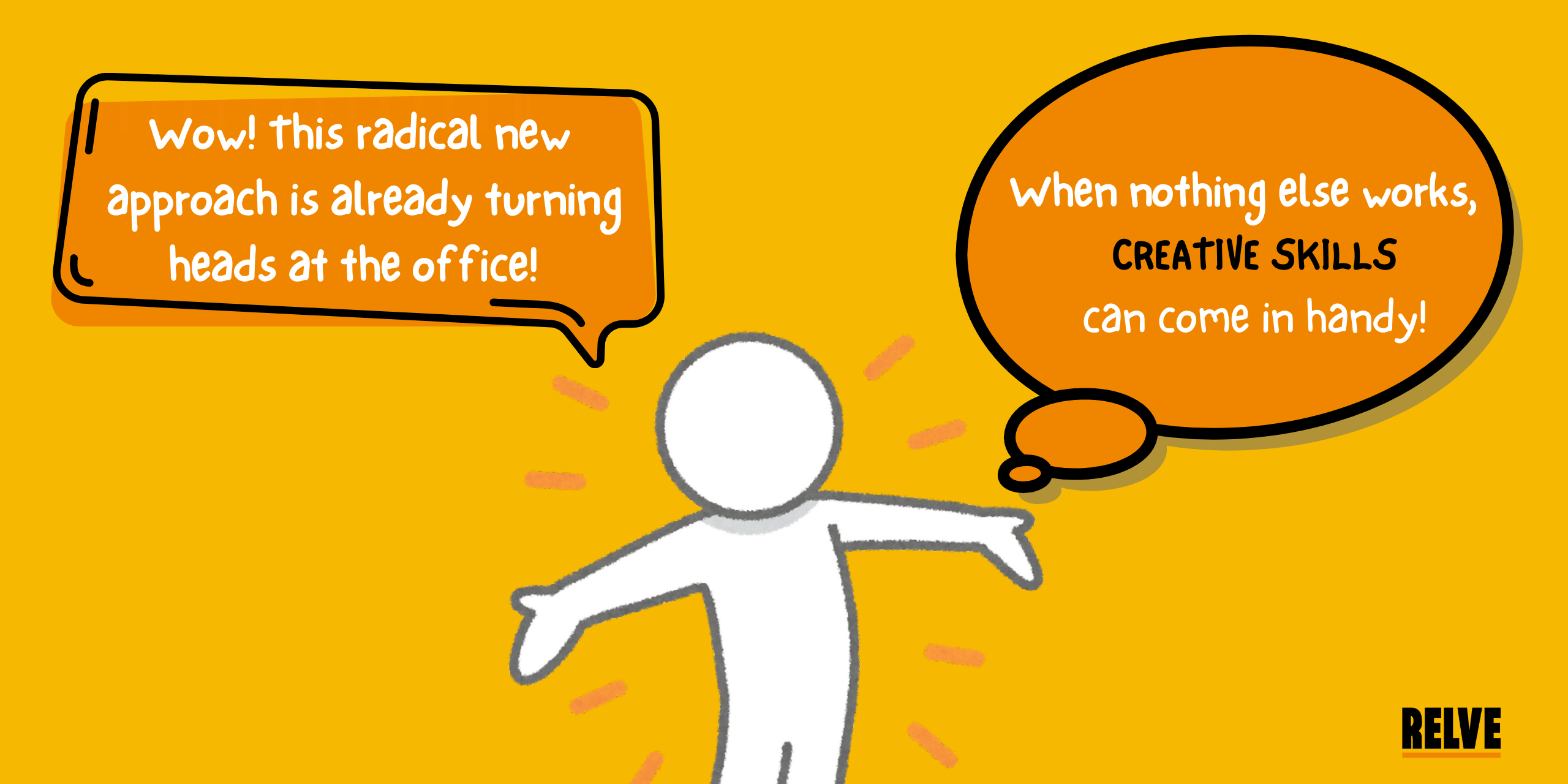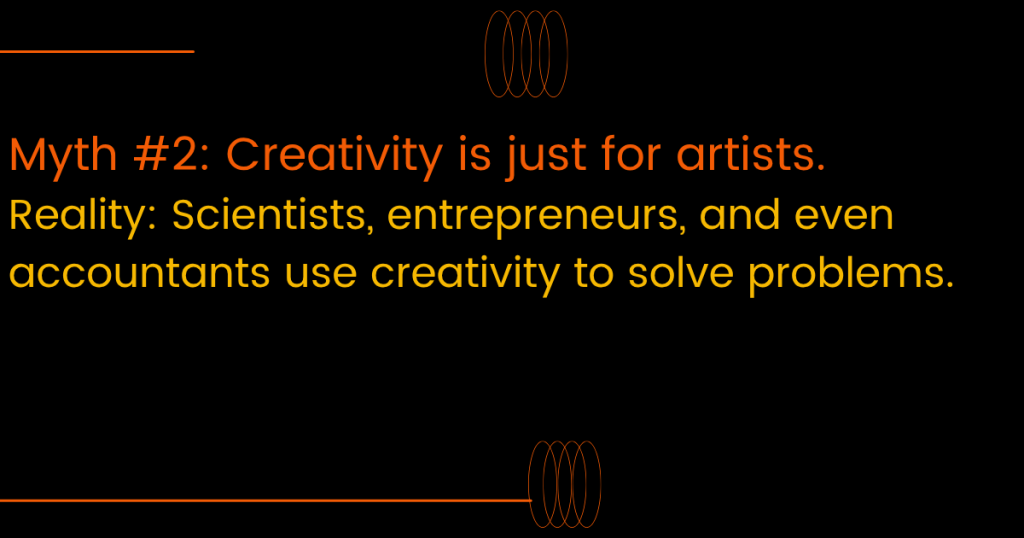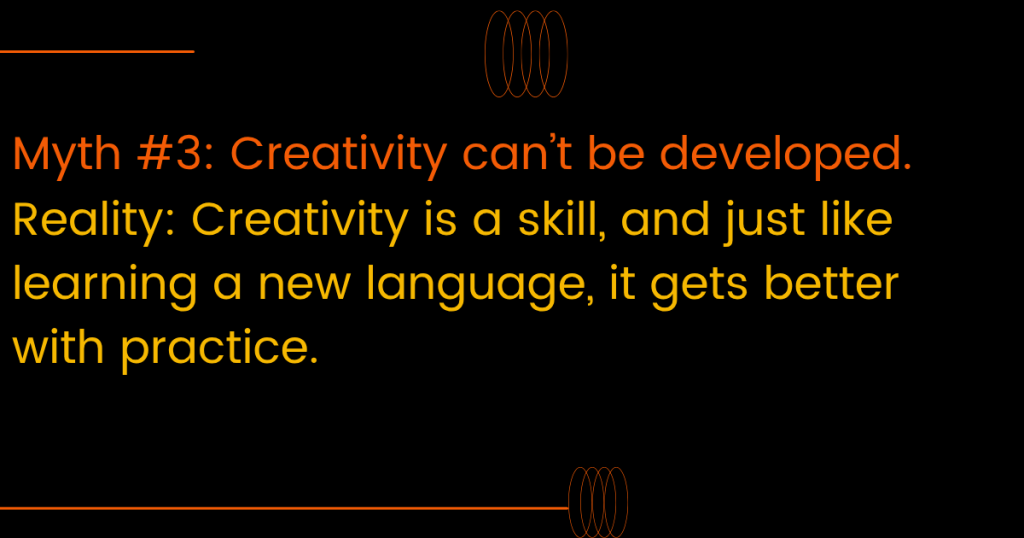“I’m just not a creative person.” Sound familiar? Maybe you’ve looked at an artist, a musician, or an inventor and thought, wow, I could never do that. But here’s the truth: Creativity isn’t a talent – it’s a skill. And just like any skill, you can develop creativity skills with the right approach.
Why Developing Creativity Skills Matters
Creativity isn’t just about painting a masterpiece or writing a novel. It’s what helps an entrepreneur come up with a million-dollar idea, a teacher designs an engaging lesson, or a scientist develop a breakthrough innovation.
Whether you’re brainstorming a new business strategy, decorating your home on a budget, or figuring out how to develop creative thinking skills to solve problems at work, creativity is the secret sauce. It’s the ability to think differently, connect unrelated ideas, and create something meaningful.
Creativity is Your Brain’s Playground
Think about the last time you came up with an awesome idea out of nowhere. Maybe you were in the shower, going for a walk, or half-asleep in bed. That’s creativity in action! Your brain is constantly making connections behind the scenes.
But here’s the kicker – if you don’t practice creative development skills, your creative muscles shrink. It’s like working out. If you don’t exercise, your muscles don’t grow. Creativity works the same way.
Good news? You can train your brain to be more creative. Ready? Let’s jump in.
1. What is Creativity?
Steve Jobs once said, “Creativity is just connecting things.” And he was right.
Creativity isn’t about pulling an idea out of thin air—it’s about connecting old ideas in new ways. Think about it:
- A car + electricity = Tesla.
- A phone + touchscreen = iPhone.
- A couch + cupholder = Your new favourite Netflix spot.
Develop Creativity Skills Beyond Art
Many people associate creativity skills development with painting, writing, or music. But creativity is everywhere:
- Scientists use creativity to develop new theories.
- Engineers use creativity to design better solutions.
- Teachers use creativity to make lessons engaging.
- Marketers use creativity to sell products in unique ways.
In other words? Creativity isn’t just for artists – it’s for everyone.
Challenge: Think Like a Creative Genius
Want to develop creative skills right now? Try this quick challenge:
Look around the room. Pick two random objects.
Mash them together to invent a new product.
(Example: A chair + Bluetooth speakers = A “Music Throne” for immersive sound while sitting!)
Creativity is about seeing possibilities where others don’t.
Creativity is not a talent. It is a way of operating.
John Cleese
2. What’s Happening in Your Brain When You Develop Creativity Skills?
Ever wonder why some of your best ideas come while you’re doing absolutely nothing productive?
That’s because your brain has two main “thinking modes”:
Focused Mode (Logical, structured, problem-solving)
Diffuse Mode (Relaxed, daydreaming, making connections)
When you let your mind wander, your brain starts connecting unrelated ideas, which is the foundation of creativity. Shower thoughts, anyone?
The Role of Dopamine in Developing Creativity Skills
Creativity is also fuelled by dopamine. When you’re happy, your brain makes more connections, leading to fresh ideas.
Want a dopamine boost to develop creative thinking skills?
- Listen to music
- Exercise
- Get outside and explore
If you believe you are creative and act as if you are creative, you will begin to create ideas out of anything.
Michael Michalko, Thinkertoys
3. Common Myths That Hold You Back from Being Creative
Let’s bust some creativity myths that are keeping you stuck in a creative rut!
4. Foundations to Develop Creativity Skills
Creativity isn’t just about coming up with cool ideas—it’s about knowing how to shape, refine, and execute them.
Here are four key foundations that make up creativity skills development:
Fluency
The ability to generate multiple ideas quickly without self-judgment.
- Exercise: Write down 10 crazy ideas in 5 minutes. No filter, no judgment.
Flexibility
The ability to think about problems from different perspectives.
- Exercise: Take a common object (e.g., a pen) and list five alternative uses. (A mini drumstick? A hairpin? A tiny sword for ants? 🐜⚔️)
Originality
The ability to come up with completely new ideas.
- Exercise: Combine two unrelated things (e.g., a bicycle + a coffee machine = the Caffeine Cruiser).
Elaboration
The ability to add details and refine ideas to make them usable.
- Exercise: Take any idea you’ve written down and expand it into a detailed concept.
5. How to Develop Creativity Skills: Practical Strategies
So, you’re convinced that creativity is a skill, not just some magical gift bestowed upon a lucky few (yay!). But how do you actually develop creativity skills in your daily life?
Here’s where the real fun begins!
A. Cultivate a Creative Mindset
Before you can start thinking creatively, you need to believe that you are creative.
Adopt a Growth Mindset
Carol Dweck, author of Mindset, says that people with a growth mindset believe skills can be learned through effort. Creativity isn’t about talent – it’s about practice.
Embrace Failure as Part of the Process
Creativity involves trial and error. Even creative geniuses fail – a lot. The key is to fail forward.
The best way to have a good idea is to have lots of ideas.
Linus Pauling
Stay Curious
Make it a habit to ask more questions, explore new ideas, and challenge conventional wisdom.
I have no special talent. I am only passionately curious.
Albert Einstein
B. Make Time for Play & Experimentation
As adults, we sometimes forget that play is where creativity is born.
Tinker, Experiment, and Try New Things
- Write without a plan
- Paint with no goal
- Mix up your daily routine
- Try improv acting or storytelling
Think Like a Kid Again
- What if you could fly?
- What if cars ran on fruit juice?
- What if your pet could talk?
This kind of “What If” thinking is a creative goldmine!
C. Engage in Brainstorming & Idea Generation Techniques
Need structured ways to develop creativity skills? Try these methods:
Mind Mapping
- Take a central idea and branch out related thoughts.
- Helps uncover new connections between ideas.
SCAMPER Technique (Substitute, Combine, Adapt, Modify, Put to another use, Eliminate, Reverse)
- Used by companies like Apple to innovate.
Reverse Thinking
- Instead of asking, “How can I solve this?” ask, “How can I make this worse?” (Then do the opposite!)
6. How to Develop Creativity Skills in Specific Areas
So, you’re ready to develop creativity skills, but where should you focus your energy? Creativity takes different forms depending on the area you’re working in. Creativity can be tailored to your needs, whether it’s problem-solving, writing, innovation, or leadership.
Let’s break it down into four major areas where creativity thrives and explore ways to unlock your full potential in each.
A. How to Develop Creative Thinking Skills
Creative thinking isn’t just about coming up with ideas—it’s about seeing possibilities where others don’t and challenging assumptions.
Strategies to Boost Creative Thinking:
- Ask “What If?” Questions – Instead of taking things at face value, push boundaries by asking “What if this were different?”
- Challenge Assumptions – Flip your perspective. Instead of “How can we fix this?” ask, “What if we broke it even more?”
- Use Lateral Thinking – Consider unrelated ideas and connect them in unusual ways.
- Daydream More – Yes, seriously. Studies show that letting your mind wander boosts problem-solving skills.
B. How to Develop Creative Writing Skills
Great storytelling isn’t just about having ideas—it’s about expressing them in unique and compelling ways. Whether you’re writing fiction, non-fiction, or marketing content, creativity is key.
Creative Writing Exercises:
- The 5-Minute Free Write – Write non-stop for five minutes on any topic. No edits, no erasing—just let it flow.
- Reverse Writing – Start with the ending and work your way backward.
- Word Mashup – Take two random words and write a short story connecting them. (Example: “Banana” + “Spaceship” → 🚀🍌)
The best words are simple and familiar, words you know well enough that it is easy to visualize the objects they represent.
Michael Michalko, Thinkertoys
C. How to Develop Creativity & Innovation Skills for Business & Leadership
Creativity isn’t just for artists – it’s the driving force behind innovation, entrepreneurship, and leadership.
How to Be More Creative at Work:
- Encourage “Bad Ideas” – Some of the best innovations come from ridiculous starting points.
- Brainstorm in Reverse – Instead of “How can we improve?” ask “How can we make this worse?” (Then, do the opposite.)
- Look Outside Your Industry – Borrow ideas from different fields and apply them in new ways.
Case Study:
When Airbnb was struggling, they realized hotel photography was boring. Their creative solution? Professional, magazine-style photos of rentals—transforming the way people booked stays!
7. Overcoming Barriers to Creativity
Even the most creative minds hit roadblocks. Here’s how to break through the most common creativity killers.
Barrier #1: Fear of Judgment & Self-Doubt
“What if people think my idea is stupid?”
Solution: Remember, EVERY great idea sounds crazy at first! Write down your wildest idea and ask, “What’s the worst that could happen?”
Barrier #2: Perfectionism
“I need to get it just right!”
Solution: Perfectionism kills creativity. Instead, aim for progress over perfection.
Barrier #3: Mental Burnout
“I have zero creative energy left!”
Solution: Step away, rest, and recharge. Take a walk, doodle, or listen to music.
8. Activities to Develop Critical and Creative Thinking Skills
Want hands-on ways to develop creativity skills right now? Try these:
Creative Writing Exercises
- Write a Story in 5 Words – (Example: “Lost map. Found treasure. Happiness.”)
- Storytelling Role-Play – Pretend you’re an alien describing Earth to your species.
Art & Design Challenges
- Doodle Every Day – Even if you “can’t draw,” doodling stimulates creative thinking.
- Colour Outside the Lines – Break the “rules” in creative ways.
Brain Games & Puzzles
- Lateral Thinking Riddles – Solve problems with unconventional logic.
- Word Association Games – Say a word and quickly list 5 related ideas.
9. Ways to Develop Creative Thinking Skills in Daily Life
Creativity isn’t just something you do at work or in art class – it’s a daily practice. Here are simple ways to boost creativity every day.
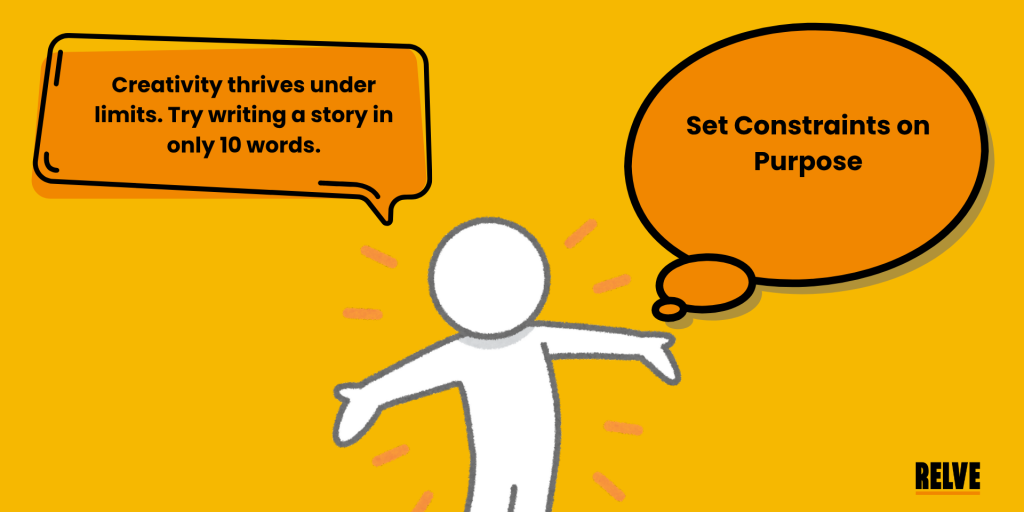
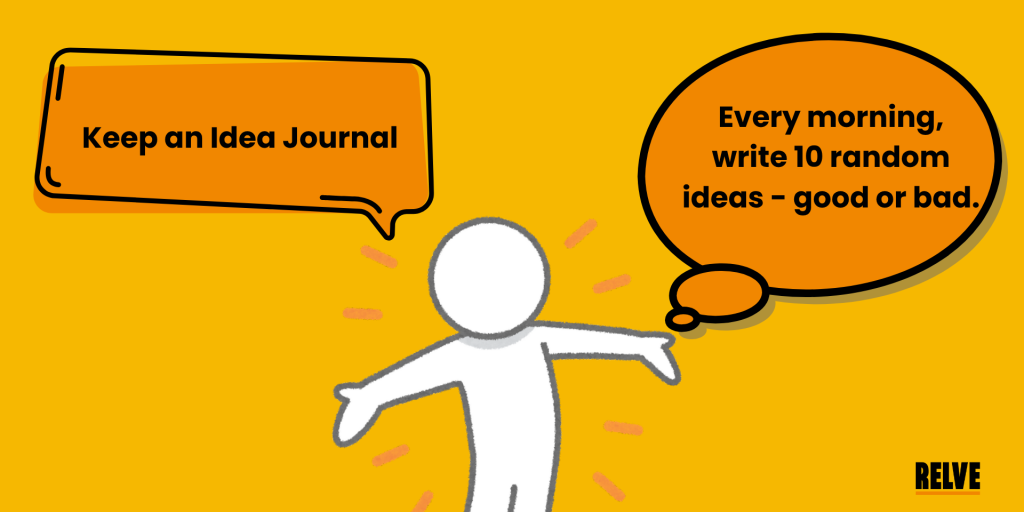
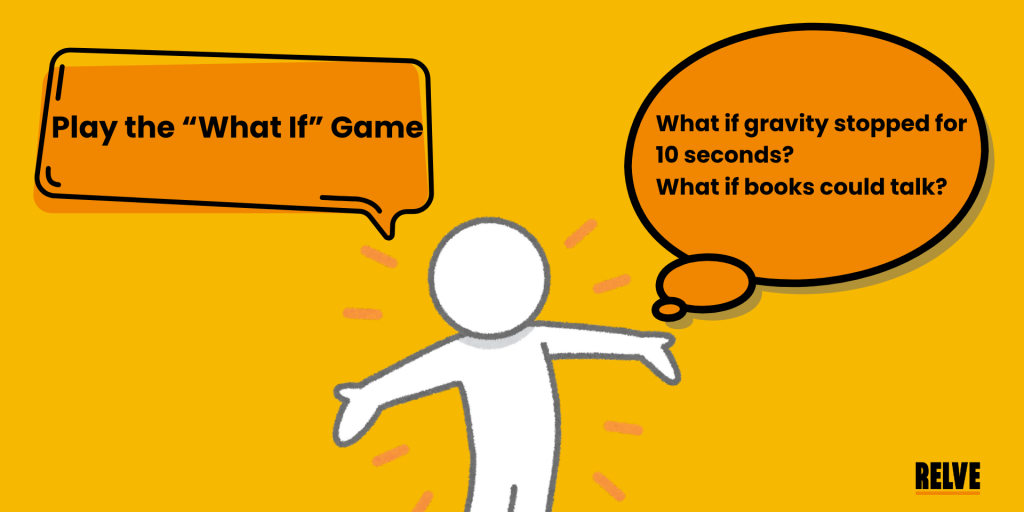
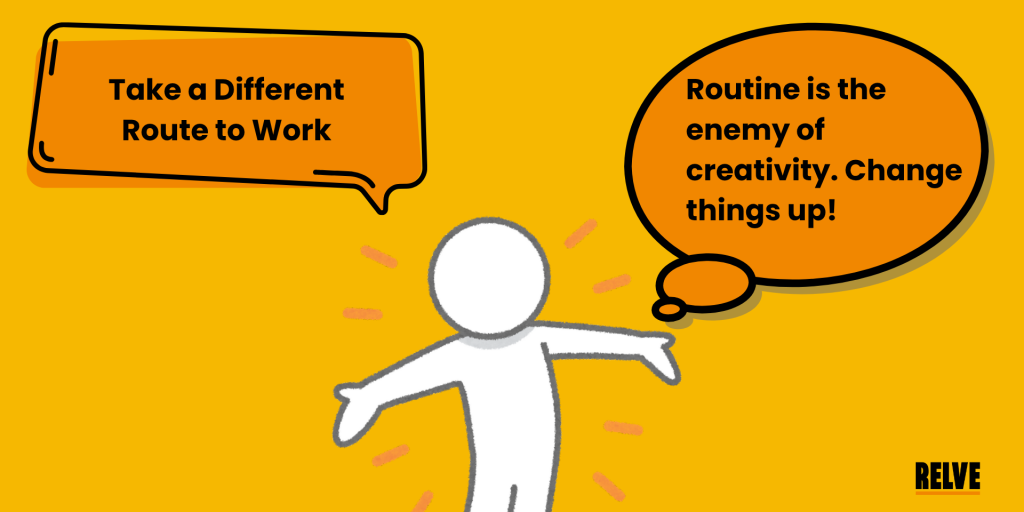
Creativity is a Lifelong Journey
Congratulations! You’ve made it through an in-depth journey into the world of creativity. By now, you’ve learned that creativity isn’t just for artists or inventors—it’s for anyone looking to think differently, solve problems, and bring fresh ideas to life. But here’s the thing: creativity isn’t a one-time skill you master – it’s a lifelong journey of exploration, curiosity, and growth.
A. Creativity is a Habit, Not a One-Time Event
Think of developing creativity skills like learning a new language or working out at the gym. The more you exercise it, the stronger it gets. If you wait for inspiration to strike like lightning, you’ll be waiting forever. Instead, make creativity part of your daily life.
Practical Ways to Keep Creativity Alive:
- Set aside 10 minutes a day for creative thinking.
- Keep an idea notebook and jot down random thoughts.
- Step outside your comfort zone—new experiences spark creativity.
- Surround yourself with creative minds—creativity is contagious!
B. Your Brain is Designed for Creativity!
Your brain loves to explore and make connections – but only if you let it. By embracing curiosity, asking “What if?” questions, and experimenting with new ideas, you’ll keep your brain in peak creative shape.
Creativity doesn’t wait for that perfect moment. It fashions its own perfect moments out of ordinary ones.
Bruce Garrabrandt
The best part? Creativity compounds over time. The more you flex your creative muscles, the more natural it becomes to think outside the box, generate fresh ideas, and solve problems in innovative ways.
C. You Don’t Have to Be “Good” at Creativity
Let go of the idea that creativity = perfection. The world’s most creative people fail more than they succeed.
The goal is not to create something perfect – it’s to enjoy the process of creating.
D. Your Next Step: Take Action!
Reading about creativity is great – but now, it’s time to take action! Start with just one thing:
- Pick an activity from this guide and try it today.
- Write down 10 wild ideas – no judgment.
- Take a walk and let your mind wander.
Conclusion: As You Develop Creativity Skills, What’s Next?
The world’s your oyster. We explored various ways to tap into your latent creative skills and how you can put them to good use to solve everyday problems. Be it at home or at the workplace, let us know which skill or technique you will be making use of as a creative troubleshooter.
